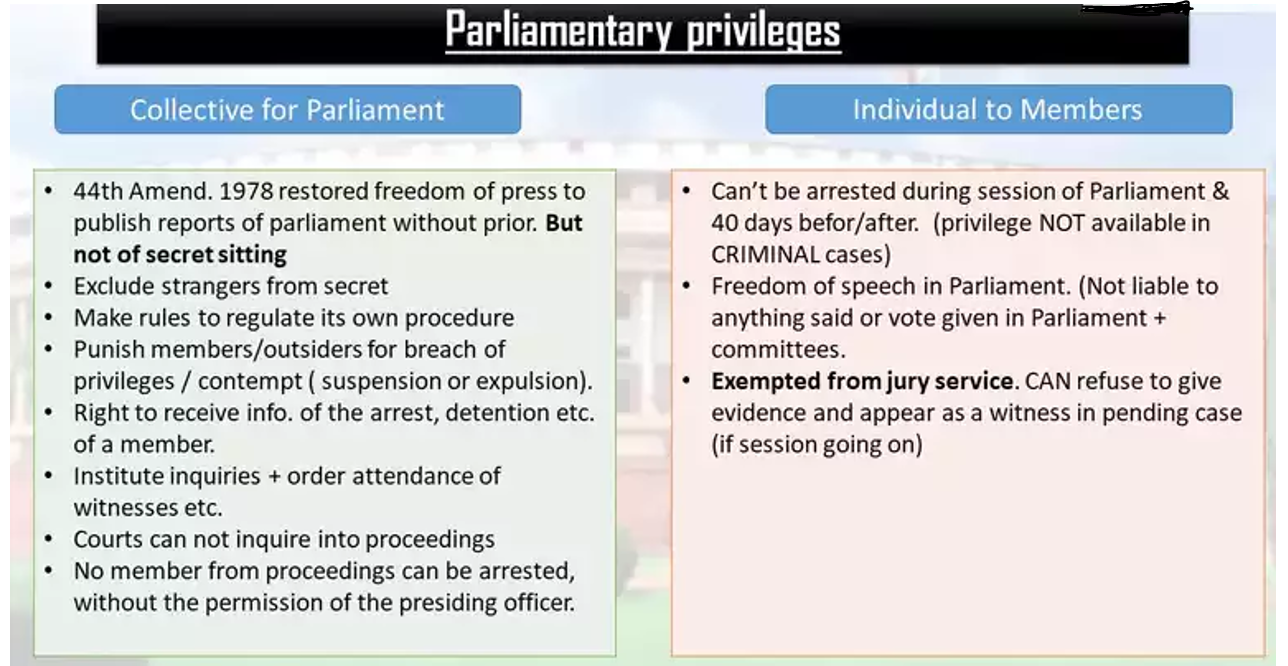[ad_1]

Context:
The Supreme Court has rejected Kerala government’s plea to withdraw criminal cases against its MLAs who were charged in the assembly.
Legislative privileges available to the members of a House cannot extend to immunity from application of criminal law, the Supreme Court said by dismissing Kerala government’s challenging the order of the state High Court upholding a trial court decision to reject the request to withdraw the prosecution of six Left Democratic Front (LDF) MLA’s under IPC and Prevention of Damage to Public Property Act 1984 for alleged acts of vandalism inside the Assembly during budget presentation in March 2015.
The Supreme Court held that legislators who indulge in vandalism and general mayhem cannot claim parliamentary privilege and immunity from criminal prosecution against leaders who destroyed public property and disrupted a Budget speech (on the State Assembly floor in 2015 Kerala government).
About Privileges and Legal immunity:
- Feature of parliamentary privileges in the Indian Constitution is borrowed from the British Constitution.
- The British Constitution is a source of other borrowed features like parliamentary government, the rule of law, legislative procedure, single citizenship, cabinet system, prerogative writs, and bicameralism.
- Legislative privileges are defined as special powers given to the legislators so as to enable them to carry out their role of framing laws in an unbridled manner and also, they are able to express their views inside the parliament without any fear of legal proceedings against them.
- Legislative privileges draw its origin from British parliament and is a convention that is being followed as “corner stone of British parliament” them.
- It was inserted as part of constituent assembly as temporary in character but it has prevailed since then and forms part of 105 and 194 Articles of Constitution.
- Rule No 222 in Chapter 20 of the Lok Sabha Rule Book and correspondingly Rule 187 in Chapter 16 of the Rajya Sabha rulebook governs privilege.
- Since Independence we have witnessed many instances of arbitrary usage of such powers, shadowing the fundamental rights of the citizens.
Benefits of a parliamentary privilege:
- The exemptions, rights or immunities provided to the members of each house of the parliament and the parliament committees secure the independence and effectiveness of the actions taken by them.
- The parliamentary privileges help maintain the dignity, authority and honour of the members of parliament.
- The parliamentary privileges help secure the members of the houses from any obstruction in their discharge of actions.
Collective privileges: That belong to both houses are:
- Right to publish records, reports, debates and prohibit others from doing the same. However, by 44th amendment others can publish true reports of proceeding except secret sittings without permission of house.
- Right to have secret sittings
- Right to informed of the arrest and release of members
- Right to punish for its contempt or breach of privilege
- No court can inquire into proceedings of house or any committees. No legal process [civil / criminal] can be served without informing presiding officer.
Individual privileges: Enjoyed by every member:
- They cannot be arrested during sessions of the parliament. 40 days before beginning and 40 days after end of each session. This extends to civil cases not criminal cases or preventive detention.
- They have freedom of speech in parliament. No member can be held liable for anything said or vote given in parliament in any court.
- Can refuse to give evidence or bear witness during parliament sessions.
Breach of privilege is an act by which any person or authority attacks the rights, immunity’s or privileges of individual or house.
Contempt of house is an act of omission which may or may not breach any specific privilege but lower dignity and authority of the house. Thus, it has a wider implication.
SC: Criminal acts by Law makers: Legal immunity cannot be extended:
- The Supreme Court ruling that legislative privilege cannot be extended to provide legal immunity to criminal acts committed by lawmakers ought to be welcomed for two reasons.
- It lays down that legislator charged with unruly behaviour that results in offences under penal laws cannot be protected either by their privilege or their free speech rights.
- Second, the decision revivifies the law relating to a prosecutor’s role in withdrawing an ongoing criminal case.
- Vandalism on the Assembly floor could not be equated with the right to protest by Opposition legislators.
- Destruction of public property could not be equated with the exercise of freedom of speech.
- It was definitely not for them to “betray the trust of the people” who elected them as law makers by engaging in wanton destruction of public property in the Assembly and then claim privilege and immunity from the very process of law.
- Parliamentary privileges and immunities are not ‘gateways’ for legislators to claim exception from the law of the land, especially criminal law.
Conclusion:
Legislative privilege and parliamentary free speech are necessary elements of a lawmaker’s freedom to function, but it is difficult to disagree with the Court’s conclusion that an alleged act of destroying public property within the House cannot be considered “essential” for their legislative functions.
Its high time that the privileges be “defined and delimited” and judiciary steps in to protect its citizen, the fights between India’s legislatures and her fundamental rights.
To maintain healthy democracy in a large country like India it is important that all pillars of democracy should perform their responsibilities independent & unbiased manner.
Codification of privileges mentioned in Article 105 and Article 194 is need of the hour to avoid above mentioned problems in future.
[ad_2]

